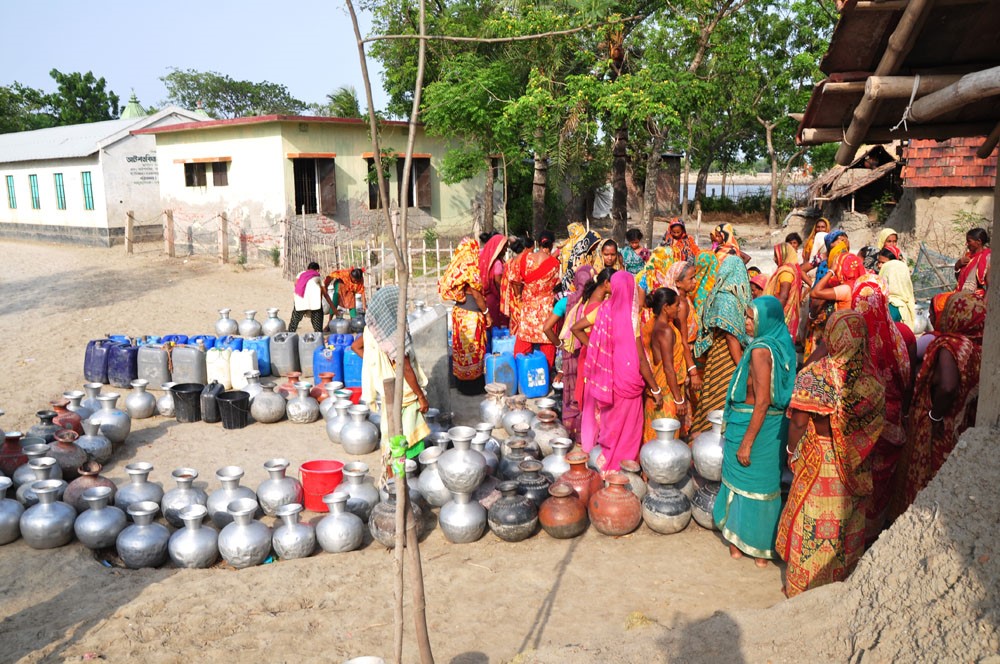WILLS POINT, TX – March 22nd is set aside every year as World Water Day. Throughout the month and beyond, Missions Box will feature news, statistics, and human-interest stories that draw attention to multiple facets of the global crisis. This article shares insights into the Top 10 countries where the water crisis is worst.

#10 – Afghanistan
It should surprise no one that a country in the 40/10 window would be included in the list. Afghanistan is not the only one, as you will see.
It is estimated that 87 percent of the water available for human use (including consumption) is contaminated. Contaminated water is considered the root cause of health problems in the country.
#9 – Ethiopia
Sources blame Ethiopia’s high mortality rate on the lack of available clean water. The natural shortage in this landlocked arid country is compounded by water-intensive farming and poor water management.
#8 – Chad
Chad is another landlocked, arid country located in the horn of Africa. The country is plagued by severe drought and food shortages which often occur several times each year. The total area of Chad is about 800,000 square miles, about three times the size of California. Of that, only 15,000 square miles is water.
#7 – Cambodia
Even with the Mekong River, the longest river in Southeast Asia, flowing through it, Cambodia is a water-poor country. An estimated 84 percent of the population has no access to clean water. The people are heavily dependent on catching and storing rainwater for their personal use.
#6 – Laos
The second Southeast Asian country on the list may also come as a surprise. Like Cambodia, Laos is dependent on the Mekong River for most of its water supply. Unfortunately, the Mekong is polluted with municipal wastewater, fertilizer, mining waste, and the ongoing construction of several dams.
#5 – Haiti
With clean water available to only half the population, the 2010 earthquake created disruption of water delivery infrastructure where it existed. The loss of access to clean water is expected to have the longest adverse impact from the quake.
#4 – Pakistan
Number four returns us to South Asia where only 50% of the people have access to clean water. Authorities believe that a lack of resources and water conversation plans have contributed to Pakistan’s water crisis. In addition, many people have never been taught about water conversation. Getting water is their primary goal, not the purity of it.
#3 – Syria
Thousands of lives have been lost in the Syrian conflict. Thousands more are dying due to the lack of water resulting directly from the war. The intensity and duration of the conflict have hindered humanitarian aid agencies from delivering much-needed water and supplies. Like Haiti, the lack of access to clean water will become one of the longest-lasting post-war problems.
#2 – Egypt
The depth and the purity of the once mighty Nile River, the chief source of water for Egypt, have diminished over many years. Of the estimated 3.8 billion cubic meters of wastewater and industrial effluent discharged in the Nile annually, only 35 percent has been treated. “The quality of Nile water is a matter of serious concern, since the Nile is the main source of water for the expansion of industrial, agricultural and recreational activities,” according to Fanack Water.
#1 – Somalia
Like Syria, the ravages of war have contributed to the water crisis in Somalia. The country has what is considered to be adequate water resources, but delivery systems have been destroyed to the extent that the vast majority of Somali people have to walk long distances to fetch the water their families need to survive.
Whether it is arid weather, growing populations, armed conflict, limited freshwater resources, natural disasters, lack of education, or pollution, the people in these countries – and many others – are suffering.
Remember World Water Day on March 22nd.
To read more news on the Global Water Crisis on Missions Box, go here.
Sources:
- Water.org, Water has the power to change lives
- Trendrr, Top 10 Countries With Most Water Shortage In The World
- World Vision, Global water crisis: Facts, FAQs, and how to help
- International Institute for Applied Systems Analysis, Is Asia facing a coming water crisis?
- Lifewater, The Water Crisis
- Gospel for Asia, Dying of Thirst: the Global Water Crisis
- National Geographic, From Not Enough to Too Much, the World’s Water Crisis Explained
- Mekong River Commission, Annual Report on Water Quality Data Assessment
- National Geographic, Southeast Asia May Be Building Too Many Dams Too Fast
- Fanack Water, Water Quality in Egypt
Sources:
- Balaram Mahalder [CC BY-SA 3.0]
For more information about this, click here.




